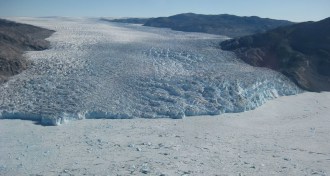
Erin Wayman
Managing Editor, Print and Longform
Erin Wayman is Science News’ managing editor for print and longform. She previously served as the production editor and reported on earth and environmental sciences for the magazine. A former primatologist-in-training, Erin decided to leave monkey-watching behind after a close run-in with angry peccaries in Ecuador. Once she completed her master’s degree in biological anthropology at the University of California, Davis, she switched careers and earned a master’s in science writing at Johns Hopkins University. Erin was previously an associate editor at EARTH and an assistant editor at Smithsonian magazine, where she blogged about human evolution. Her work has also appeared in New Scientist, Slate, ScienceNOW and Current Anthropology.

Trustworthy journalism comes at a price.
Scientists and journalists share a core belief in questioning, observing and verifying to reach the truth. Science News reports on crucial research and discovery across science disciplines. We need your financial support to make it happen – every contribution makes a difference.
All Stories by Erin Wayman
-
 Climate
ClimateCarbon dioxide in atmosphere reaches landmark level
At 400 parts per million, greenhouse gas concentration is now higher than it has been for millions of years.
-
 Earth
EarthJapan’s 2011 earthquake upped Tokyo’s risk
Chance more than doubled that capital city will soon experience big temblor, researchers calculate.
-
 Earth
EarthThe Arctic was once warmer, covered by trees
Pliocene epoch featured greenhouse gas levels similar to today's but with higher average temperatures.
-
 Climate
ClimateIce loss from Greenland’s glaciers may level off
Simulation suggests long-term effect on sea level not as dire as some predictions.
-
 Earth
EarthToxic waste sites may cause health problems for millions
Exposures to lead and chromium represent particular problems, study finds in India, Indonesia and Philippines.
-
 Anthropology
AnthropologyPaleofantasy
What Evolution Really Tells Us about Sex, Diet, and How We Live by Marlene Zuk.
-
 Space
SpaceSnapshots reveal details of Saturn’s gigantic hurricane
Storm dwarfs anything on Earth, with enormous eye and whipping winds.
-
 Earth
EarthEarly Earth’s chlorine blown away by giant impacts
Low levels of chlorine on planet's surface have long puzzled scientists.
-
 Earth
EarthRemnants of Earth’s crust survive in the planet’s interior
A slab stayed unperturbed in the mantle for billions of years before resurfacing, sulfur measurements suggest.
-
 Earth
EarthYangtze’s age revealed
Geologists narrow window on time of the Chinese river’s origin to 23-36 million years ago.
-
 Planetary Science
Planetary ScienceFaint Young Sun
Scientists struggle to understand how early Earth stayed warm enough for liquid water.
-
